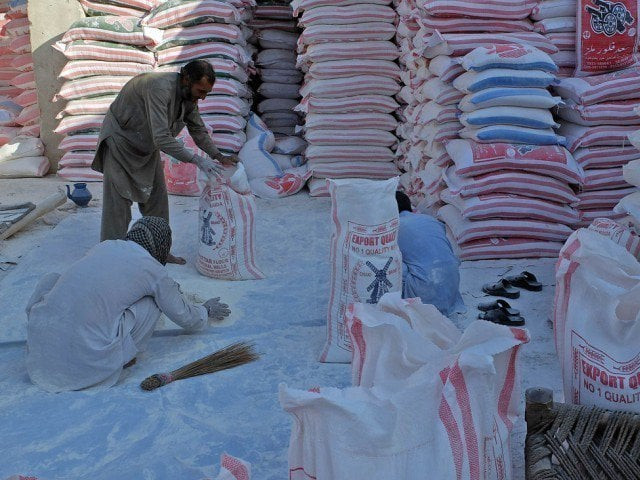Cheap flour: a short glimpse of power of market
Arrival of low-cost imported wheat leads to decrease in flour prices

Wheat is the main staple for 250 million Pakistanis, which is eaten at least twice a day. All governments have been striving to ensure the availability of wheat since the 1950s and have relied on the minimum support price and the procurement plan for maintaining strategic reserves through the purchase of domestic and imported wheat.
Except for a few years, the country has witnessed wheat flour price hikes. During such a crisis, neither wheat nor flour vanished from the market, rather nasty players engineered price surge owing to “protectionism” in the wheat policy. Since the 1950s, Pakistan has spent trillions of rupees and billions of dollars to ensure the affordability of wheat through an inefficient policy. The economic cost of this flawed policy has ultimately been paid by the masses.
Protectionism through an indirect subsidy has neither developed the flour industry for competing in the international arena nor helped wheat growers. Consumers have always remained at the mercy of flour millers’ cartel. The real market economy is dormant and the debt related to commodities’ operation is running into billions of rupees. The current economic scenario is a wake-up call for policymakers to opt for policy revamp and stop the huge drain on resources.
From July 2023 to March 2024, Pakistan imported about 3.64 million tonnes of wheat. Despite the government’s procurement from growers at the all-time high support price, the import of huge quantities worth $1 billion indicates that the existing policy has failed to encourage an increase in domestic production.
On the other hand, the procurement policy has caused losses every year. Federal and provincial governments release their stocks to flour mills at subsidised prices to ensure the availability of flour in the market but frequent flour crises reflect the failure of the policy, which runs against the market economy.
It is time to give freedom to growers to cultivate crops of their choice such as high-value oilseed or other crops and let all stakeholders in the wheat sector compete in a healthy fashion. The current decline in flour prices may prove short-lived, but it carries a strong message for policymakers to exit the support price and procurement policy. If the recent arrival of low-cost imported wheat has corrected market prices, let it run naturally and undo the old policy.
Drawbacks of import and export ban
Price volatility: Bureaucratic decisions to ban wheat exports or imports frequently in response to local price fluctuations can lead to uncertainty and volatility in the domestic market.
Exports of wheat flour and its value-added products should always remain open to attract private sector investment and after completion of local harvest, wheat imports should be allowed till the new sowing season begins. This will eliminate hoarders and stabilise flour prices.
Market distortion: The ban on imports and exports, and the government’s procurement of huge stocks disrupt the natural flow of wheat, leading to inefficiencies and misallocation of resources. However, smuggling must be dealt with iron hand. Shortages: Import bans can exacerbate shortages in the domestic market, especially during times of high demand or poor harvests.
Reduced competition: Restrictions on imports and exports reduce competition, allowing certain actors, such as the state-owned TCP and Passco, to make inefficient imports, or well-connected individuals to manipulate the market.
Rent-seeking and manipulation
Profit motive: Government officials and well-connected individuals may exploit their positions to profit from wheat trade, whether through commission on imports, hoarding or manipulation of prices.
Corruption: Coوrruption is often endemic in such systems, with officials taking bribes to facilitate or influence wheat imports, exports or the allocation of resources.
Black or parallel market: Import and export bans can lead to undocumented wheat trade with a reduction in tax collection and further price distortion.
What should govt do?
The federal government spends a huge amount every year to procure wheat from growers through Passco. Provincial administrations also fix their support prices for procurement through food departments, which bear heavy costs including incidental charges and the theft of stocks.
Besides, the commodity is damaged due to the lack of a proper storage as often stocks are seen lying under the open sky. Rains and floods destroy the stocks along with the theft of stored grains by the corrupt officials.
To overcome all the aforesaid financial costs, the government should do the following: One – the private sector including traders, flour millers, commercial exporters and importers should be allowed to procure wheat from the domestic market or make imports subject to the mandatory stockpiling policy. Some 10% of the commodity should be kept at Passco and TCP warehouses subject to the payment of market-based rental for a period of one year.
Two – Stocks can be replaced with fresh ones from time to time. Three – Flour millers and commercial exporters should be allowed exports of flour against keeping 10% of wheat stocks at the government-designated warehouses. Four – Importers can also import against the same 10% stocks allowed to exporters. All the interested parties will sign an agreement with Passco and the TCP that in case of any shortage, the government can buy the stored commodity at the purchase cost of local or imported wheat. This will help the government to build strategic stockpiles without any financial cost.
Five – Passco and the TCP will keep stocks in warehouses as per international grain storage standards and will fumigate periodically. The private sector will pour investment into grain storage in modern silos while flour mills will export wheat flour, fine flour (Maida), semolina and other value-added products.
Six – A special quota for Afghanistan as per their population consumption be allocated to the private sector through open bids as the dollar rate in Afghanistan is less than that in Pakistan.
The writer is a Commodities Connoisseur, former board member of REAP and former VP of KCCI
Published in The Express Tribune, April 29th, 2024.
Like Business on Facebook, follow @TribuneBiz on Twitter to stay informed and join in the conversation.









1733130350-0/Untitled-design-(76)1733130350-0-208x130.webp)









COMMENTS
Comments are moderated and generally will be posted if they are on-topic and not abusive.
For more information, please see our Comments FAQ